
 |
| Main Page |
| Photo Galleries |
| Writing |
| Aikido |
| Zen |
| Peeps |
| Links |
| Contact |

July 2004
July 31, 2004
Travelling off the beaten track in Italy can get a little more difficult if you don't have a car, but after a little bit of a journey we have made it to Montepulciano.
Now Montepulciano Station shouldn't be mistaken for Montepulciano, the town. Only a very silly person would make that mistake. No, though they bear the same name, they are about 15 kilometers apart, with a rather significant amount of elevation emphasizing the distance. Montepulciano Station, then, is only called that because, when all is said and done, Montepulciano is the closest human settlement to where the train stops.
Actually, had it not been for the help of the aforementioned "Very Useful Train Schedule", we wouldn't have even known to get off the train, as there was no sign and...no real station, really. The train just, well, stopped.
"Is this Montepulciano?" an American tourist asked
tentatively as Laura and I hopped off the train.
"Must be!" we chorused, having faith only in the yellow book
that had brought us there.
But our confidence took a bit of a hit when we walked into the parking lot and saw...nothing. A few people sped by on ATV's, and a couple of old men were drinking at the canteen by the station building. In truth, however, the canteen was the station building.
The American asked us nervously where we were staying, pointing out that he could only see four buildings total, so he couldn't imagine where the hotels would be. Laura cheerfully replied that we had a reservation, and she promptly headed for a phone booth to get directions to the hotel.
The call didn't go so well.
In a line reminiscent of Seinfeld's Soup Nazi, the conversation ended with the person shouting "Daylee? No Reservation for you!"
Then the phone card ran out.
We decided to split a taxi with some other people stranded by the roadside into town, and one of the old men in the canteen called 'someone he knew'. As the young man sped up the hill with the five of us in the car, the other three passengers all found out that the hotels they had reservations at were in a different town, much to their chagrine. Things didn't seem to be going so smoothly for any of us.
I called the hotel back once we reached the centre of town, which was about 15km from where we got off the train. After insisting that we had a reservation, the lady said "Ah, Elly!"
It's funny how names can be butchered in another language. Bailey turns to Elly, and the other day I ended up having to answer to Erwin. Whaddya do.
Montepulciano, despite the difficulties in getting here, is spectacular. It is Tuscany in a nutshell. When we went to the tourist office and asked what there was to do here, the lady laughed and said "The wine! And cheese!"
"Okay! We'll drink then!" I said enthusiastically, and she was greatly pleased.
So that's what we're going to do. Even as I write this I am letting a bottle of the local stuff breathe...just 30 minutes to go before we can drink it. And the 'local stuff' isn't too hard to find; when Laura asked the shopkeeper which bottles were local, he just made a sweeping gesture with his arm that took in the whole shop.
So now we'll drink the wine while looking over the fields it was grown in. After all, our hotel is called Bellavista, which in Italian means 'Beautiful View'...and they're not joking.
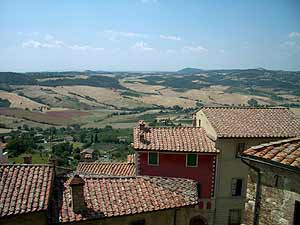
July 30, 2004
A few days ago Laura and I were in Perugia, sitting on a rooftop patio just outside the city walls and watching the sun set on the broad, fertile valley below. In the distance, nestled in on the side of a mountain was a city of pink and grey stone, its walls painted in soft pastels by the light of the sun. The evening was clear, so even at such a great distance a curtain wall was visible behind the bulk of the town's cluster of houses, leading up sharply to a citidel. There was no mistaking it; we were looking across the valley at Assisi.
The following day we boarded a bus and followed the roads between the fields of olive groves, wheat and burnt grass until we found ourselves at that distant town, looking back now at Perugia, the way we had come.
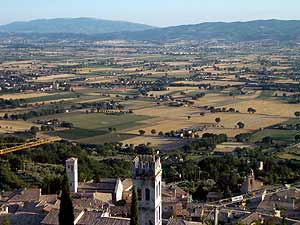
Assisi. The name of the place is synonymous with the name of the Saint the town produced, and the approach to the hilltop settlement is dominated by the fortress-like outer wall of the church that bears his name; San Fransesco. Known to us in the English speaking world as Saint Francis of Assisi, his mark on this town has been made not just with the great building erected in his honour, but also with the flocks of pilgrims who come to see the place of his birth, and of his life.
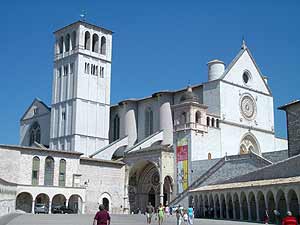
It's hard not to come to this place and feel the influence that this man has had. As a person with an interest in Buddhism, Saint Francis is also one of the first figures in Christianity that I have felt any identification with, and it was interesting to make the hike up the mountain yesterday to the caves and the hermitage to which he would retreat for peace and reflection. The similarities and the connections between his life and those of the Zen monks with whom I am more familiar are impossible to miss.
Today I interviewed a man here in Assisi who is running a small food shop that deals in 'Slow Food'; locally produced food that is made using natural ingredients and traditional methods. It was quite an interesting interview, and in combination with our visit next week to Orvietto, a 'Slow City', I am hoping to have the material for an article on the subject. I'd also like to put something together for the website, as well, as the Slow Food movement is something that I would like to see spread in Canada as well. For now, check out the website. Yum.
Tommorrow we are heading off for Montepulciano in Tuscany, home of the yummy wine that bears the same name.
July 27, 2004
Perugia is an absolutely amazing city. True, the street layout is random. But the city offers a look at a very different type of Italian city with a very different set of roots. Seeing the parts of the Etruscan walls that still loom over parts of the city gives a very strong impression of the power they once held, and the scale on which the ancient city had been built.
It's also interesting because this city is so incredibly old that it seems that the people here are engaged in a constant effort to keep the whole thing from collapsing. At the end of our street, workers were putting up a steel frame in order to prevent the rupture of an old wall that has clearly had such troubles in the past; the whole side of the building has been - sometime in the distant past - buttressed with an extra layer of stone. The skyline of the city is peppered with cranes, not to put up new buildings but to repair the old.
After visiting the Scuola di San Rocco - the great hall filled with Tintoretto's work in Venice - Laura and I decided we needed to figure out just what all these paintings were about. We tracked down a copy of the Gospels according to Mark, and since we've been in Perugia I've been reading Luke's Gospels. It's all so much clearer now! Viewing all of this artwork without knowing anything about the bible is like trying to laugh at an inside joke you're not included in. Though we were getting to know what was involved in the Passion of the Christ simply by the number of times we'd seen it represented by various artists, skimming through the 'source material' certainly helps to make sense of it all.
And this just in...I've finished off the Venice page. For now, at least. I'm sure Laura will object to how few pictures there are, but then, she's asleep, so her vote doesn't count at the moment! I honestly didn't know where to begin with this one. I think that everyone's experience in Venice is by nature a very personal one, so it was hard to put down even a fraction of the impressions that I had while there. Maybe this will have to be a first installment.
As of tommorrow, Laura and I are headed into a much smaller set of towns, and with that, I fear that our luck with wireless may run out. Perugia has surprised us, but Asissi - where we're going tommorrow - is pretty much guarranteed to be a wireless dead-zone. After that it's Montepulciano (yay, wine!), then Pienza (heck, they don't even have a train station) and then Orvietto. I won't be holding my breath, so don't be alarmed if you don't hear from us for just a little while.
But after that it's Rome! It's hard to believe that our last stop is so close at hand, and Laura and I are pretty excited.
July 26, 2004
There is one thing that I know for sure; the Etruscans could not plan cities as well as the Romans. Of course, the mistakes were made about two or three thousand years ago, so this extreme case of hindsight is probably not so helpful for the people of Perugia now.
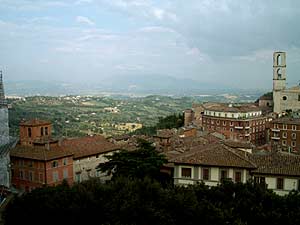
So there it is, we are now in Perugia, a hilltop town in Umbria which was founded long ago by the ancient Etruscans. The city is beautiful, but suffers from a road layout that I am positive must have been the original inspiration for spaghetti. After wandering for three quarters of an hour uphill, trying to find our way downtown from the train station, I came to the important realisation that the map was merely making approximations, as an accurate rendering of the literally overlapping layers of roads shooting in all directions would be impossible.
The Romans always used a very predictable town layout, with straight, perpendicular streets forming the backbone for the rest of the town. The Etruscan city planners, by contrast, seem to have used the lesser known method of dropping a live fish to thrash around in the dirt, which would then leave behind a pattern that would represent the town plan to be used. A creative technique, to be sure, but not the most effective.
Perugia has a very different feel from the other towns that we've been to, and though confusing, the narrow streets with their vaulted passageways are incredibly beautiful. Today we are going to go out and explore the city a little more, and to see what it's like to be lost in the back streets when we don't have our packs on.
July 25, 2004
There is one thing that people generally don't want to see on the day that they are planning to go to an outdoor performance, and that is rain clouds.
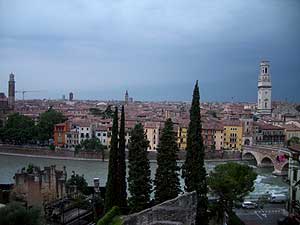
As Laura and I explored the city and climbed the steps overlooking the Roman theatre and the city below, we noticed some rather ominous looking clouds swooping in from the horizon. By the time we were making our way out of the theatre, lightning was arcing across the sky.
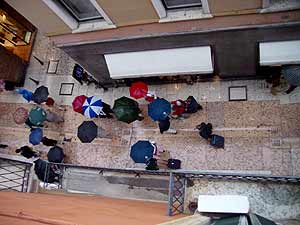
Rain pelted down for the rest of the day, prompting us to stop by the Arena to see if the show would be cancelled. We were told that no decision would be made until eleven o'clock at night, so we proceeded on to the supermarket to stock up on wine and cheese for the show. That is the beauty of the upper level seats; it's actually encouraged for you to bring a picnic dinner to the opera.
Laura and I showed up early for the show, the rain still driving down, as all of the people in the with unreserved tickets scrambled for position on the bare stone stadium seats. We spread out our food, hunkered down under our ponchos, and waited.
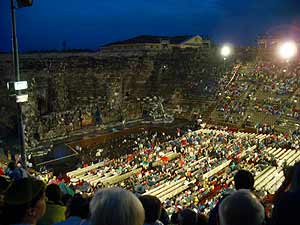
Sure enough, as the hour approached for the show, the rain began to let up. A costumed woman came out onto the stage, sounded a gong - the sound of which wafted up through the stands after a full second of delay - and the orchestra took their seats. The rain had stopped fully, and the exuberant crowd erupted in applause.
It really was a magical moment. The lights in the giant stadium faded away, and in the darkness the great curve of the stands was described only by the tiny, flickering points of light thrown from the candles held by thousands of the spectators. The glow of a crescent moon showed through a break in the clouds as the show began.
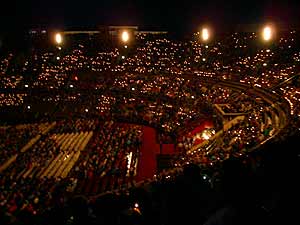
The stage was at one end of the arena's oval, and the elaborate set used a portion of the ancient stone that made up the stands behind it as a part of the scenery. Despite the enormous venue in which they were playing, neither the singers nor the orchestra used any amplifiers, and the sounds projected up to us with a kind of clarity that can't be created by any artificial means. It was truly incredible, our first opera experience, and both Laura and I were completely rapt.
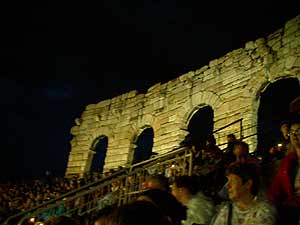
Then, minutes into the first scene of the second act, a sprinkle of rain came down. The lively song came to a jerky, amusing and unnatural end as the string instrument players bolted for cover before the brass knew what was happening. Howls rose up from the crowd as thousands of voices joined together to curse the rain.
Ten minutes later, the rain abated and the orchestra again took their seats. They restarted the song, and barely managed to finish it before the rain started again.
And that was it. A call to the weather bureau confirmed that there was no end in sight for the rain, and so the show was called off. And that's when the next show began.
Everyone filed out of the Arena, looking as they went for where they should go to get their tickets refunded or exchanged for the show the next day. It was while Laura and I were doing this same search that we came across an angry mob that was surging into the information office.
Based on the apoplectic fits of rage into which the people in the mob were falling, Laura and I began to suspect that there would be no refunds. We stood there nonetheless; partly to see if the officials would change their minds, and partly because I had never seen so many people shouting all at once. People were wildly gesticulating, veins on foreheads were bulging and the hum of the crowd would flux depending on who was shouting. One particularly enraged young woman got a round of indignant applause from the mob before an equally enraged staff member began his counter-tirade, pounding a pamphlet of terms and conditions with his finger.
The rules went something like this; the second the first act ends, there are no refunds. We were moments into the second act, so as they kept saying, the case was clear-cut.
When we went to the ticket office this morning to see if there was any chance of a refund, there was a German man who didn't see the matter as being so simple. Though Laura and I had stretched our budget to the maximum to see the show, the fifty Euros we had shelled out wasn't crippling. The man in line ahead of us had bought floor seats for himself and his friends...almost nine hundred Euros worth. That's about 1500 dollars Canadian. I don't think he was satisfied with what he got for 1500 dollars!
So we saw about half-an-hour of opera, but even in that span of time both Laura and I had the chance to be blown away. The voices, the music, the setting, all combined to make one of the most impressive experiences I have had in my life. And seeing a mob of infuriated Italians was no less impressive, and for no extra charge.
July 23, 2004
It....is....so....very........hot.
Please excuse this unpleasant imagery as I explain my circumstances...
I am now sitting in my darkened hotel room, stripped down to my underwear and waiting for the sun to go down. Laura is prostrate on the bed, where I have been going to occasionally change the cold cloth I put on her forehead.
Yesterday we formed a strange sort of brotherhood with the man in the apartment across the street. He was leaning out of his third floor apartment, wearing nothing but a pair of briefs while drinking a rum and coke. When he saw Laura and I at our window, he gave a little start, as he hadn't been expecting to be seen. It only took a moment, however, for him to notice that we were similarly attired, and he relaxed and went back to trying to cool himself with his drink.
Venice was scorching hot, but at the end of the day, still seemed to enjoy at least some cooling effect from the water.
We are now in Verona. There is no water here.
When I saw a thermometer yesterday, it read 33 degrees Celcius. That was after 10 pm. It's now reading 37 degrees...and that's in the shade.
Verona, despite the debilitating heat, is amazing. It is a place that seems to bear the remains of its ancient origins in a way that is - so far as we've seen - quite unique.
I'll explain more, but for now I have to quickly shut down the computer, as it is about to overheat.
Okay, I'm back. It seems that the computer has cooled down to a safe temperature again (though I'm not sure that I have!).
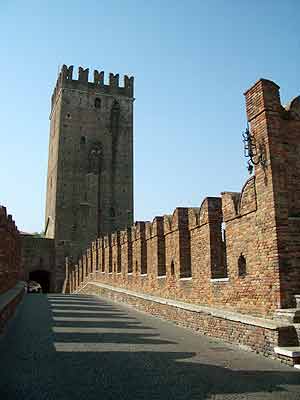
Oh yeah, Verona. Verona is very old, with its first inhabitants going back to prehistoric times. It later gained prominence as a Roman town, and there are still a number of Roman structures left in the town. And that is what is so interesting about the place.
Laura has always remarked that so many of the cities we have visited seem to have a sort of uneasy relationship with the relics and ruins from their past. They aren't sure if they can use them, and they can't bulldoze them, so in many cases they just sit; ancient heaps of rubble in the middle of an otherwise normal neighbourhood.
Verona is a fascinating exception to this. Yesterday as we strolled through one of its many pedestrian streets, we noticed something interesting up ahead. The street suddenly widened, with the centre carved away to reveal a separate layer of ancient ruins below. The sculpted opening in the road with its handrailings marking out the spot seemed to turn the remains of the past into a display, and the area seemed to form a sort of organic whole that emphasized not only the signs of civilizations past, but also their relation to the present. It was quite striking, and is an admirable way of achieving the aims of both preservation, and of maintaining a livable space for people in the present.
Another simple example that we found today was a very old building, complete with Roman columns in the interior, that had been converted into a grocery store.

But there is another example of this fusion, and this example is the reason why I am more excited right now than I ever was a kid on the night before Christmas...
Verona is home to an arena that was one of the largest of the Roman world, with capacity for about 22,000 people. Built in the first century, the massive structure still dominates the central square of the city. This in itself is pretty cool. Just to see a place so grand and so old is quite an experience.
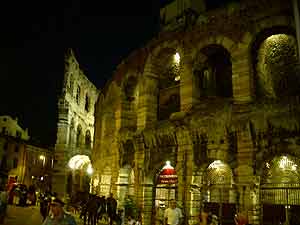
The truly exciting part of it is that each summer, the Veronese use the ancient arena as the venue for an opera festival. As the sun sets over the hills, people stream through the arena's vast gates to fill its 44 tiers of seats, and the vast amphitheatre resounds with the voices of the entertainers and the thunder of applause.
That two millenia later this building is still in active use is an incredible thing. That Laura and I have tickets for tommorrow night is even better. I'm so excited I can barely contain myself, and have been babbling about it all day (between gasps for air in the oppressive heat).
July 22, 2004
I'm now writing this update while sitting on a train leaving the island of Venice. While doing this, however, I am aware that the last update that made it onto the internet was written before I even came to Venice, and my email outbox is crowded with messages that all start with me saying "I am now on a train bound for Venice..." If you get an email that seems like it's about 10 days old, it's because it is.
When I checked my email at an internet terminal before leaving our hotel, I saw a message from my mother lamenting Italy's lack of wireless networks and the corresponding lack of updates on my site. I take solace in the fact that even if I am a terrible geek, at least it seems to be infectious!
I can't rave enough about Venice. I'm almost finshed writing up a page on it, and have only to add in some pictures to cap it off.
Yesterday Laura and I visited the Peggy Guggenheim collection, with it's display of cubist and surrealist art. It's fascinating to see a gallery of modern art in a city such as Venice, where we were able to see the art of our century only a day after seeing the Venetian master Tinterretto's work nearby. Though of course it is difficult to compare the two, the contrast in focus seems to tell a lot about the societies and times that produced the artists.
Yesterday, at long last, Laura and I struck a major victory against the mystery of the Italian rail system, and highlighted - at least for me - an interesting part of the Italian character that is very reminiscent of what we encountered in Greece.
You see, in Greece, one can never really expect a helpful reply from anyone in a service job. Take the example of the bus station, where Laura and I wanted - predictably - to take a bus. Because there is rarely information posted (and if there is, there is no indication of where it is posted) one is forced to always go to the information desk for every possible inquiry. The lesson to be learned, however, is that the answers will always be the absolute minimum that is possible, and thus a great deal of persistence is required. For example:
"Excuse me, is this the place for the bus to _____?"
I would ask.
After being fixed with a hateful glare, or being ignored either long enough
to make me feel like a nuisance or feel that I had to repeat the question,
the attendant would simply bark a "Yes." then look away again.
It took a while before I learned that at this point, it is necessary to
stick in there, despite the fact that I was not on the path to forming
any bonds of friendship with the person on the other side of the desk.
Clearing my throat, I would proceed; "And what time is the next bus?"
Met again with an anguished look that made my very presence seem to be
a great source of annoyance and - yes - even physical pain, I would get
a "Five minutes."
Pushing on in the face of obvious exhasperation at my stupidity, I would
ask "And where does the bus stop?"
This question would often have to be repeated, as at this point the attendant
would either be trying to make phone calls or otherwise devise some means
of escaping this distressing interrogation.
"Over there!" they would finally shout, waving an angry hand
vaguely to some spot that was furthest from the information booth.
"And what is the bus number?"
"Number 54!!!" I would get through clenched teeth.
Now let us remind ourselves that the easy answer to my very first question would have been to say: "Yes, bus 54 for ____ stops there in 5 minutes."
There, was that so hard?
The trouble we have had in Italy is that our planning has been hampered by the fact that we have no idea whether many of the places we would like to go are accessible by train. Logically, one would imagine that this information would be available so that someone could, well, take a train somewhere. Knowing where you are going and when has the lovely effect of allowing you to make reservations; an important factor in avoiding sleeping on benches.
I think I have mentioned before our last attempt to procure this information. We deduced that the best place to find out what we wanted to know was (can you guess?) the train station. The man at the information counter seemed angry with our apprarent stupity, and seemed to find the idea that we wanted a map of the train network absurd.
"Where you go?" he demanded, ignoring our question
as to whether such a map did, indeed, exist.
"Well, many places." I said, not wanting to spend the next hour
standing with the man planning our trip for the next month and a half.
"Many places, many places!" he repeated my words angrily, "Where
you go?" he demanded again.
We supplied him with the names of enough cities to placate him and keep him from coming around the counter at us before we fled, deciding that there must not be any way of knowing where the trains went in Italy. For a while we adopted the approach of just assuming, and buying tickets in hopes that the connections were possible. I would often lie awake at night, dreaming of the detailed plans of the national train network for Japan that we used when travelling there.
Well, yesterday our luck changed. We had gone to visit a church, but arrived before it was open. The only thing open in the small square was a travel agency, where we decided to try our luck again.
Miraculously, the lady did not think that what we wanted was ridiculous, and in fact actually seemed to know what we were talking about. Usually our requests are met with the blank, incredulous stare that you would expect if you went in and asked where you could buy a flying pony. She even told us where to get one (the book, that is...not a pony).
Laura, not as carried away by excitement as I was, had the presence of mind to ask what the name of this fabled book actually was. The lady laughed as if asked a most charmingly naive question by a child and said "Orario di treni", or "Train schedule". Go figure.
So the magical book is called a 'train schedule', and to add insult to a festering, month old injury, they are available at every newsstand in the country.
Let me just compare this for a moment to Japan, if I may. Laura and I were planning to go on a trip to Tokyo, so I went to the local JR station to check the schedule books that they have laid out on tables for just that purpose. On seeing me scrutinizing the pages, one of the station masters came out to help me plan my journey and make the best connections, while showing me how to use the book. When I asked if I could buy a schedule (which they don't sell at the station) the station master apologized profusely, then ran into the back room and brought me the schedule from the previous year so that I could at least use it as a reference. He then gave me directions to the nearest book shop where I could buy the most recent one. That took about five minutes.
The same thing in Italy has taken a month. Vive la difference.
Needless to say, after one night sitting in our room with the superb train schedule that has the routes and times for every train in the entire country, our trip is now planned. Better late than never!
July 19, 2004
In typical fashion, I sat down to write a little update which quickly became so long-winded that I needed to cut-and-paste it into a new page. The inspiration for my rambling: Venice. It's hard not to talk about a place so incredible as this...but after all that cutting and pasting, I won't start again now! I'll be putting up the Venice page forthwith.
As a tie-over, though, I have this to offer: Paris.
July 15, 2004
At a loss for what to do between Pisa and Venice, Laura and I decided on a whim to stop midway in the small city of Ferrara.
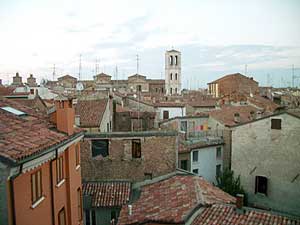
The city - which I had never heard of before - is only about a half hour north of Bologna, tucked neatly away in the quiet countryside that surrounds the Po river.
The beauty of having so few expectations about a place, though, is that it's difficult to be disappointed. Ferrara, however, could not disappoint. As it turns out, it is one of the most beautiful towns we have yet seen outside of Tuscany (their little hill-top towns are tough to beat), and all at once fulfills so many of my hopes for things I wanted to see in Italy.
First of all, Ferrara is a walled city. I've seen a walled town before, but to see an entire city enclosed within enormous fortress walls is very impressive. Laura and I rented bikes today, and spent the afternoon cycling around the perimeter of the city and looking at the fortifications, which remain mostly intact to this day (they are about 1000 years old).
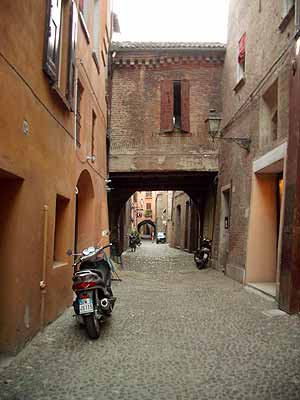
Ferrara also has those winding, narrow cobblestone streets that I've always pictured when I think of Italy, and much of the city centre looks as if nothing has changed in the last few centuries (except for the TV antennae).

All in all, it is one of the nicest, most livable cities I have yet to see in Italy. One of the greatest things about the city is that despite its age, it appears to be very much a place designed for people. There are tonnes of pedestrian streets, as well as bicycle lanes and jogging paths, and nothing ever seems to far away to walk.
Oh yeah, and they like beer here, too. The place can't be all bad!
July 12, 2004
The last of the major geek projects has been finished; I've finally put together the archived comments in an organized way. The file that all of the past comments were dumped into had gotten so large that it was pretty much crashing my program every time I tried to add anything to it...I can only imagine how long it would take to load for anyone daring enough to try and read the page.
The crazy thing about putting it all together was the realization that I've been putting together this web journal (in its present incarnation) for almost exactly two years now. Cutting and pasting all of the various entries (which are now laid out by month and year, but will soon have references to events as well) was a sobering experience, and it almost made my head spin to see all of the different things Laura and I have done over the last two years laid out in front of me like that. If you can spare a little time, I think you should take a look. Click around a bit, and maybe it will give you an idea of why Laura and I are so excited to be coming home, at long last. That's a lot of time, we've done a lot...and we're a more than a little tired!
Part of the reason that I was able to do such an extensive update to the page (without hanging out of a hotel window for three hours) is that - for the first time - we have found an internet cafe that will actually allow us to connect our laptop. Yesterday was only the second time in two months that we used a wire to connect to the internet, and the first time was when the guy started screaming at me in Florence.
Wow...in that last paragraph I realized (and by that I mean that Laura corrected me) that we have been travelling here for two months now. We quit our jobs at the end of March, have been homeless since the 23rd of April, and have been in Europe since the 15th of May. And what a long strange trip it's been!
We're now in the process of co-ordinating with our dear friends at home; planning on getting a place to live (hooray, at long last!) and going on one last big trip, this time by canoe.
But before I sound completely lost in either the past or the future, let me say a thing or two about the present.
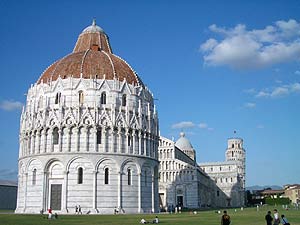
Today took a long walk around Pisa. Pisa is one of those unfortunate places that is so renowned for one particular sight that the rest of the city seems to wallow in neglect. While tourists flock to the piazza where the Leaning Tower is found, the beautiful cobblestone streets that meander through the rest of the city centre between faded buildings and intriguing alleys lie quiet and unnoticed.
I am charmed by Pisa, but it is sad to see such a beautiful city as this in such an advanced state of decay. For all its past glory, Pisa does not appear to be a prosperous city. The pastel plaster is crumbling from the front of the buildings, graffiti is creeping onto almost every flat surface (one statue of a past dignitary has "Rock'n'roll" spray painted across its front) and many of the buildings look all but abandoned.
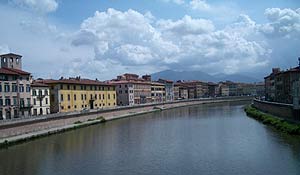
But somehow, the place is wonderful. Perhaps its beauty was once such that even now, through all the crust which layers its surface, it still shines through. I can't quite put my finger on it, and admittedly, it could be simply that the people in the internet cafe here were obliging, but I can't help but like the place.
July 11, 2004
This morning we arrived in Pisa, a beautiful city in Northern Italy that seems to consist - astonishingly - of more than just a single, faulty tower. Who knew?
We have left Cinque Terre behind us, and with it, one of our bank cards. We suspect that the land lady from the room we were staying in may have taken it, but a little wine and a little pasta seems to heal all wounds.
I think the highlight of our time in Cinque Terre was our budget breaking lunch in Vernazza. Considering that the area was renowned for its food, and that village was said to have the best food in the area, and the restaurant was said to be the best in the village...well, we had to eat there.
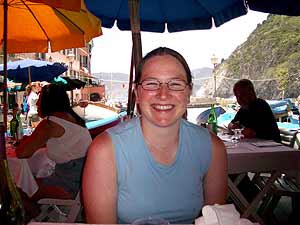
We sat down for two bowls of pasta, but some quick rationalizations about how cheap the next city was going to be helped us to add in some appetizers and wine. Yum. The mussels were the best I've ever had (and probably the freshest) and the pesto...well, the pesto was so good it's given me a new perspective on pesto altogether.
Anywho, I've put up a Cinque Terre page, so you can get more details about recent events there.
July 10, 2004
There are now exactly five weeks to go in our trip. It is getting to the point now where earlier parts of the trip seem like they are so long ago that they must have been part of another trip. Early on it seemed like there was no way that I had bought enough film, but then laziness and the convenience (and instant gratification) of the digital camera set in, and now it seems like there'll be enough. The number of places we've been to and seen starts to make you wonder what on Earth we'll be able to do with all those pictures anyway!
We are now in Monterossa, on of the five villages that makes up Cinque Terra. I'm not going to say much about it here, as I'm in the process of putting up a page about it.
We're getting ready to pack up and head for Pisa in the morning, from where we'll be heading to Verona and then on to Venice, where we're hoping to catch their Regatta and fireworks festival.
July 7, 2004
I think that we can all agree that that last post was pretty weak. I started off on something, but then got distracted.
Yesterday Laura and I did the hike up to the summit of 'Montaronne', which stands at a height of almost 1500 metres. Now there may be a number of ways to translate 'Montaronne', but I think that the one that Laura would choose would be 'Mountain of Insects.'
First of all, I have to say that I credit any country where you can stop part way up a mountain hike for a bite to eat, and though I was impressed to find a bowl of noodles on Mount Fuji, I was even more impressed to see that as we headed up Montarrone, we were able to get a four course meal and a bottle of wine.
But back to the bugs...
At first I thought Laura might be complaining. "Aagh...bees!" she would say. "Whiner." I would think. And indeed there would be no insects around me, so it took me a while to take heed of Laura's increasing pleas for mercy from her winged tormentors. But Laura's persistence in her complaints finally made me take a second look...only to realize that she was, as a matter of fact, being swarmed by bees, flies, mosquitos and various other winged creatures. So surprised was I to see the plague of insects surrounding Laura that I had to quickly double check the air around myself. Surely, I thought, if that's what's going on around Laura, there must be some very large and angry insects around me!
But no. The only thing around me was the slight tang of the mountain air. For anyone who's ever seen the Snoopy cartoons, Laura looked like Pigpen.
Despite my assurances that it was only because she was 'sweet as a flower' or because she 'smelled nice', Laura would not take any comfort amidst her plight. At one point on the trail, when Laura's patience had come to an end, we stopped to try and fight off some of the more persistent bees that had been dogging her for an hour or so. It wasn't until we stopped that we heard the disconcerting noise of thousands of bees buzzing somewhere nearby.
Understandably, Laura looked very concerned. With her luck as it had been to that point, she was likely to be killed by the coming onslaught, and the nearest lake to jump into to escape them was several kilometers down the mountain.
"Let's run." Laura suggested.
I thought a moment, then aquiesced. And so it was that we spent part of our ascent running, trying to put some distance between us and the ominous buzzing emminating from the forest.
The mountain we were climbing had a particularly satisfying peak; one of those ones that comes to a point, is free of trees or obstructions and gives a 360 degree panorama (which is generally pretty good at 1500m).
What we found at the top was a view of the even larger mountains that are a part of the run-up to the Alps, mostly shrouded in dark, fast-moving storm clouds. The alarming part was that the fast moving clouds were headed our way.
Something wouldn't let me walk away, despite the fact that we were now being approached not by clouds of bees, but by other clouds that could be equally uncomfortable for us very shortly.
So we sat a moment. It's funny how being deprived of one sense, as they say, can enhance the others. We had come to the top for the panoramic view, but the incoming clouds, though not yet above us, had gone swirling into the valleys below, concealing the crystalline lakes of the area, and the rolling hills we knew to lie beyond. So as we sat there, slightly underwhelmed by the view, the peculiarities of the audio-scape revealed themselves to us.
Up there on the mountain top, we were too far away to hear any of the noise from the distant town below, and we sat above the insulating effects of the trees or the echos of nearby rock faces. The strange effect, which I have never experienced before, was that of a perfect singularity of sound. A small bird flew past us, singing its particular brand of song, and I was stricken by the directness of the sound, and the fact that I was hearing it in total isolation. There was no background noise of a any kind, nor was the song I was hearing a reflection. It was almost like hearing the essence of bird-ness, distilled into a state of purity by the altitude.
The bird was good, but the thunder was arguably better (but it is hard to beat pure bird-ness!). Lightning began to arc across the sky in front of us.
And then the rumbling came. At times the thunder came to us directly, but then the storm began to pass between two massive mountain peaks in the distance, and the deep bass of it came at us magnified in the natural amphitheater. The incredible show continued until we realized that the storm was almost upon us, convincing us that it was time to go.
And that's the best part about that mountain; you can hike up it, but there's a cable car down.
July 6, 2004
Last night we found the mother of all Italian restaurants. After spending almost three hours there, we were hardly able to walk back to our hotel...but it was worth it.
July 3, 2004
Okay, so now we are comfortably ensconced in a lovely room looking over the calm waters of Lake Maggiore and the Alps, a far cry from our downtown room in the heart of Milan. I'm now ready to write a little more about what we've actually been doing, rather than give details of my recent and extensive website maintenance (exciting as that may be).
Milan turned out to be a rather charming city, though with unexplicably expensive hotels. For fifty Euros we had a saggy bed, almost no light in our cave-like room and cockroaches in the mildewy bathroom that I didn't mention to Laura yet...what a bargain!
That being said, we found ourselves in the middle of a typical urban Italian neighbourhood, with all the ammenities one would hope for; the local coffee bar, the bakery next door, about fifteen pizzarias and two supermarkets. I think what was most fun in Milan was the fact that it wasn't - unlike so many Italian cities - so packed with incredible things to see that you felt the constant urge to be in a hundred places at once, so as not to miss a thing. The city has a few sights, all impressive, but for the most part is simply a slice of modern Italy in all its chaotic, colourful, life-loving glory.
Every morning started with a cappuccino, or 'cappuchi' as the guy called it, made in a fraction of a minute as you stand at the bar by a guy so practiced in their production that it was difficult to tell which was more of a cappuccino machine; him, or the thing on the counter. The cappuccinos cost a Euro there, as opposed to the five Euros they cost in Paris, and were so much better that it seems disrespectful to even use the same word for the two beverages.
We'd take a quick bite from the bakery (amazing foccaccia with olives, usually) on our way to see the sights, before grabbing a picnic lunch for the park (paninis that - again - defy the humble designation of 'sandwich') and heading back to 'the cave' for siesta.
And that, really, is the trick to travelling in Italy; it's all about the siesta. Where at first glance it seems that everything shuts down in the afternoon and that Italy is so inconvenient, you soon realize that, well, it's really hot, and maybe a little nap after eating a wedge of gorgonzola cheese isn't such a bad thing after all! And what do you know? When you wake up a little nibbly around six o'clock, the stores are open again, and shortly after that, the restaurants open their doors. One would have a hard time convincing me that all this was a bad thing.
Now yesterday - owing to the terrible tedium of sorting files on my website for five hours, and then of spending two more hours balancing the laptop on the windowsill uploading my page - I feel that I committed some small injustice to the stunning pinnacle of Gothic architecture that is Milan's Duomo. As such, I have written a little more in an attempt to convey the significant degree to which both Laura and I were impressed by the city's chief attraction.
Being now in our lovely room here by the lake, I feel compelled to say a thing or two on how to write a tour book. Anyone who has travelled even a little can understand that even the smallest bit of information about the unkown place where you are to be going would be very helpful.
Now our place in Milan was described as 'tidy', a description which has since made me realize that I need to consider the hair-splitting of the writers as I ponder the difference between 'tidy' and 'clean' (remember the cockroaches).
Imagine, now, that having seen the subtle games of semantics that the writers are playing, I have since been very attentively analyzing every word in the descriptions to try and divine the hidden meaning that I am sure the circumspect authors have left concealed in their descriptions for the benefit of the attentive.
Putting yourself in my concentrated and suspicious frame of mind, then, try to form an opinion of the following, this being all that was written of the room we were to check into today:
"The affordable blue-tiled rooms have cement balconies"
This was the only description given for the hotel, and the hotel was the only option given for the city.
So given the wordplay used in the Milan hotel's description, I felt that as we headed here on the train today that I should consider deeply the choice of adjectives used in this brief recommendation.
At the beginning, we have 'affordable', which is a good thing. Our guidebook - being targetted at low-budget backpackers - describing something as 'affordable' seemed like it could be only a good thing, I thought. and so I moved on, considering the other, more cryptic, portions of the passage.
"...blue-tiled rooms..."
Now in a one sentence description of a place, I would imagine that every word would be chosen with some care. After all, this is a book covering a score of countries and spanning over 1500 pages, so prose is kept to a utilitarian minimum and descriptions (I would imagine) are kept as concise as possible.
There must be, then, some great import attached to the tiles in the room. Could they be some shade of nausea-inducing blue, covering the floor, walls and ceiling in some sort of nightmarish coccoon that might drive the uninformed and unsuspecting backpacker to the brink of insanity? Is that why they mention the 'cement balcony', because I might throw myself from it in a state of panic brought on by the heady blueness of the tiles?
Or were the tiles a good thing? Was this a great bargain, to find a blue-tiled room that was actually - can you believe it? - affordable?!
And then, lastly, there was the cement balcony. Was the mention of the cement a way of curbing my excitement at the fact that I would have a blue tiled room; "Wow! It has blue tiles! Amazing...but wait, oh; the balcony is cement...I guess that's why it's still affordable."
But really, when you think of important aspects of a balcony, what questions do you ask? Is it North or South facing; is it big or small; can you sit on it; does it have a view, or does it overlook a wrecking yard? But no, the one question that everyone always asks is...what is it made of? Now if it was made of carved ivory, that would be worth mentioning. But cement? C'mon.
So here we are. The room, as it turns out, is great, though the big balcony overlooks the train tracks and the tiles aren't actually blue. The place is both clean and tidy, which is nice, and is a five minute walk from the lake (good to know).
July 2, 2004
To start off with the most mundane of updates, I have just about completed a mojor overhaul of the website. The disappointing thing is that nobody will be able to notice the difference, because it's all on the administrative side of things, but it was all spurred by an error that was slowly spreading through the site and threatened to disable the whole thing...quite annoying. Also, as I had run out of space for my site (which has grown to rather mammoth proportions) I have bought more webspace, and should now have a faster connection, as well.
Wow...so how's that for exciting!?
On a more interesting front, Laura and I are headed for the lake country up near the Alps tommorrow, leaving the hustle of Milan behind us. We spent the morning in the Duomo here in Milan, which is the third largest cathedral in the world. Those who began its construction actually had the aim of making everyone after them think they were mad, and they succeeded. The project took hundreds of years, and was only finished by order of Napolean. The result is a building of staggering proportions, but which is also constructed with an intricacy that one would think impossible for a building of its size. It has most certainly made me excited to see the grand-daddy of all churches; St. Peter's Basilica.
Well, I'm sorry for such a lame post, but I've now been sitting in front of this computer for hours (instead of sleeping) fiddling with my site, so pictures and funny stories will have to wait until later. But one last exciting bit of news to tide you over; I had some really good pizza for dinner.
That is all. Oh yeah...if anyone finds dead links and missing pictures, please let me know. What a mess!